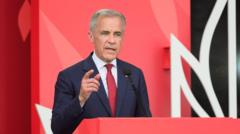Is Lineker the BBC's Top Earner for the Eighth Year in a Row?

Gary Lineker Tops BBC's Salary List Amidst Controversies and Cultural Reflections
The BBC's annual report has created ripples in the media landscape once again, especially with the revelation that Gary Lineker remains the top-paid presenter for the eighth consecutive year. Earning between £1,350,000 and £1,354,999, Lineker's salary has sparked discussions on pay equality, the culture within the BBC, and the challenges faced by traditional media in a streaming-dominated era. As the corporation grapples with internal issues and public scrutiny, the report sheds light on various aspects of its operations, including audience engagement and financial health.
Lineker and Ball: The Pay Disparities of BBC Presenters
In the realm of television, salaries often become a focal point for debate, and this year's report highlights a notable disparity. Following Lineker, Zoe Ball, who previously hosted the Radio 2 breakfast show, earned between £515,000 and £519,999. This represents a significant drop from her previous earnings of approximately £950,000 to £954,999, a reflection of her transition away from the breakfast slot to a new role on Saturday afternoons.
Understanding Salary Structures at the BBC
Interestingly, the BBC's pay structure is complex. Many high-profile presenters are not included in these salary disclosures, particularly those paid through BBC Studios or independent production companies. This lack of transparency raises questions about equity and the true financial landscape of the BBC’s talent pool.
Lineker's Departure: A Shifting Landscape
Lineker's recent departure from his long-standing role on "Match of the Day" after 26 years marks a significant shift in the BBC's presenter lineup. His exit was prompted by a social media incident that drew considerable backlash, leading to a broader discussion about the responsibilities and repercussions faced by public figures in the digital age. Although he remains the highest-paid presenter for now, his absence will be felt in future reports.
The BBC's Culture and Recent Controversies
The annual report also highlights the ongoing cultural challenges within the BBC. The resignation of several staff members following a rigorous review into workplace culture underscores the importance of a healthy work environment. Chairman Samir Shah remarked on the "string of revelations" concerning abuses of power, emphasizing the need for systemic change.
MasterChef Allegations and Wider Implications
Among the controversies is the recent inquiry into presenter Gregg Wallace's behavior on the popular show "MasterChef," where 45 allegations were upheld. Furthermore, co-host John Torode faced separate allegations of using racist language, shedding light on the pressing need for accountability within the BBC.
The Impact of Cultural Awareness on Broadcasting Standards
As the BBC navigates these controversies, it becomes clear that cultural sensitivity is crucial. The inquiry's findings serve as a reminder for the corporation to uphold high standards of conduct and to foster an inclusive environment for both employees and audiences. The implications extend beyond individual cases, touching upon the BBC's reputation and its long-standing commitment to public service broadcasting.
Financial Health: Analyzing the BBC's Revenue Streams
The report indicates a slight increase in revenue from the licence fee, rising from £3.7 billion to £3.8 billion after accounting for inflation. However, there was a notable decrease in the number of households paying for the licence fee, dropping from 23,131,000 in 2024 to 22,772,000 in 2025. This decline of 359,000 households, or 1.56%, signals potential challenges ahead for the BBC as competition from streaming services intensifies.
Audience Engagement Trends
Despite the challenges, the report reveals a positive shift in public perception. Approximately 50% of UK adults believe the BBC effectively provides impartial news and current affairs, marking a 5% increase from the previous year. Additionally, 63% of respondents perceive BBC news as accurate, a rise from 59%. These statistics highlight the BBC's enduring role as a trusted news source amidst rising competition.
Generational Differences in Media Consumption
Interestingly, while the overall usage of BBC services among adults has seen a slight decline from 75% to 74%, the engagement among under-16s remains robust, with 70% using BBC services weekly. This demographic trend indicates that the BBC still holds relevance among younger viewers, particularly through platforms like iPlayer, which has become the fastest-growing platform for long-form content.
Christmas Day Programming and Audience Preferences
The BBC's ability to draw in audiences is exemplified by its Christmas Day programming, where all top 10 shows were from the BBC. However, it’s worth noting that this includes shared broadcasts like the King's Speech on other channels. The ability to captivate audiences during key viewing periods remains a testament to the BBC's enduring popularity.
The Role of Controversial Programming
Amidst the successes, the BBC has faced criticism regarding its programming choices. The decision to broadcast performances, such as Bob Vylan's set at Glastonbury, drew public scrutiny and highlighted the challenges of balancing artistic expression with viewer expectations. Such decisions impact the BBC's reputation and provoke discussions around content curation in a diverse media landscape.
Lessons from Recent Controversies
The cancellation of "Gaza: How to Survive a Warzone," due to its controversial narrator, serves as another reminder of the delicate balance the BBC must maintain. The report concluded that the BBC shares responsibility for the editorial oversight failures, emphasizing the need for rigorous content evaluation to uphold the corporation's commitment to accuracy and impartiality.
Looking Ahead: The Future of the BBC
As the BBC confronts the challenges of changing audience dynamics, internal controversies, and financial pressures, it must continue to adapt to maintain its relevance. The interplay between traditional broadcasting and the rise of on-demand content presents both challenges and opportunities for the corporation.
Embracing Digital Transformation
The future success of the BBC may hinge on its ability to embrace digital transformation. By enhancing its online presence and expanding its offerings, the BBC can attract younger audiences while retaining its core viewership. This approach will ensure that it remains competitive in a rapidly evolving media landscape.
Building Trust and Transparency
Moving forward, the BBC must prioritize transparency in its operations, especially regarding presenter salaries and internal culture. By fostering an inclusive environment and demonstrating accountability, the corporation can rebuild trust with its audience and stakeholders.
Conclusion: Navigating a Complex Future
The BBC's annual report paints a multifaceted picture of the corporation's current standing, highlighting both strengths and areas for improvement. From salary disparities to cultural controversies and audience engagement trends, the challenges ahead are significant. However, with a commitment to transparency, accountability, and innovation, the BBC can navigate the complexities of modern broadcasting and continue to serve as a vital source of news and entertainment for the public.
Frequently Asked Questions
What is Gary Lineker's salary at the BBC?
Gary Lineker earned between £1,350,000 and £1,354,999 in the last financial year, making him the BBC's highest-paid presenter for the eighth year in a row.
Why did Zoe Ball's salary decrease?
Zoe Ball's salary decreased from approximately £950,000 to between £515,000 and £519,999 due to her transition from the Radio 2 breakfast show to a new Saturday afternoon role.
What controversies has the BBC faced recently?
The BBC has faced controversies regarding presenter conduct, such as allegations against Gregg Wallace and John Torode from "MasterChef," as well as criticism over programming choices like the documentary "Gaza: How to Survive a Warzone."
How has audience engagement changed for the BBC?
While overall weekly usage among adults decreased slightly from 75% to 74%, the BBC remains popular among younger audiences, with 70% of under-16s using BBC services weekly.
What does the future hold for the BBC?
The future of the BBC will depend on its ability to adapt to digital transformation, enhance transparency, and maintain audience trust amidst a competitive media landscape.
The BBC stands at a crossroads, facing numerous challenges and opportunities. As it seeks to evolve and adapt in the digital age, how can the corporation best balance innovation with its traditional values? #BBC #GaryLineker #MediaReform
Published: 2025-07-15 11:03:07 | Category: technology



